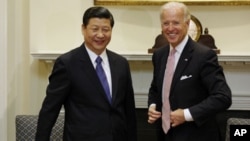Several days after other major nations, China has finally acknowledged President–elect Joe Biden’s projected victory in the U.S. presidential election, which was called by major American news organizations on November 7.
“We extend congratulations to Mr. Biden and [Vice President-elect Kamala] Harris,” foreign ministry spokesman Wang Wenbin said at a regular daily briefing Friday.
"We have been following the reaction to the U.S. presidential election of both the United States and the international community,” he added without elaborating on his country’s delay. “We respect the choice of the American people. Meanwhile we understand the results of the U.S. election will be determined according to U.S. laws and procedures."
The delayed response, several days after the leaders of other major countries tendered their congratulations, was a bit of a surprise for those who felt Chinese President Xi Jinping would be relieved at the electoral defeat of President Donald Trump, who has battered China with tariffs, tough rhetoric and other economic moves.
Some analysts suspect that Beijing was taking care not to anger Trump before lawsuits filed by his administration are resolved. That view was bolstered by the spokesman’s suggestion that the outcome still remains subject to “U.S. laws and procedures.”
But Chinese leaders also have reason to be wary of a Biden presidency, given a recent statement by his campaign office declaring Chinese action against Muslims in the Xinjiang region as “genocide.”
“I think the most plausible reason [for China’s delayed response] is that Trump has not yet conceded, and China does not want to irk him at this 'sensitive' time," said Douglas B. Fuller, associate professor at the City University of Hong Kong.
China is listening
China has reliable “ears” for listening to diverse political voices in the United States and U.S.-trained scholars to analyze them, sources said.
“The Chinese leadership also believes that it has the upper hand in the bilateral relationship and need not exhibit too much enthusiasm in welcoming the Biden-Harris team until they make some friendly gesture or announce rollback of some of the harsh anti-China measures taken by the Trump administration,” said Mohan Malik, visiting fellow at the Washington-based Near East South Asia Center for Strategic Studies.
Democrats are known by Chinese leaders to have strong views on human rights issues and even act on them, and analysts say that is something Beijing may have to contend with in the coming years.
In a late October statement, Biden campaign spokesperson Andrew Bates said, "The unspeakable oppression that Uighurs and other ethnic minorities have suffered at the hands of China's authoritarian government is genocide, and Joe Biden stands against it in the strongest terms.”
Malik said, “Beijing is certainly apprehensive of the Biden administration taking a more critical stance on the suppression of Xinjiang Muslims than the Trump administration. This is one instrument in his toolkit that President Trump didn’t employ.”
At the same time, there are several areas where leaders of the two countries would like to work together.
“Xi Jinping would like to end the trade war and is aware that Biden would reopen discussions to overcome the current trade impasse,” according to Lawrence C. Reardon, associate professor in the department of political science at the University of New Hampshire.
Climate issues
Beijing is also aware that Biden will want Chinese cooperation when he returns the United States to the Paris Agreement on climate change, something he has pledged to do. China, the world’s second-biggest economy, is also the biggest pollution emitter, although the Xi government has taken a series of stern measures to check carbon emission levels.
Given the situation created by the COVID-19 pandemic, there are very few people in the U.S. who will publicly speak up for China. John Thornton, a former co-president of Goldman Sachs who has played a key role in U.S.-China backdoor diplomacy for decades, said he believes Biden and Xi should directly communicate with each other.
“They should meet early in the new American administration in person for a personal reconnecting,” Thornton said at a webinar Wednesday hosted by the Center for China and Globalization think tank, based in Beijing.
“They should also assign very high-level working teams to create a road map for all serious issues — the sequence of the issues, the responsibility for them and the time frame they should be addressed,” Thornton said.
U.S. Trade Representative Robert Lighthizer and China’s Vice Premier Liu He have done an impressive job sorting out some of the trade differences, and this work should be taken forward, Thornton said.





